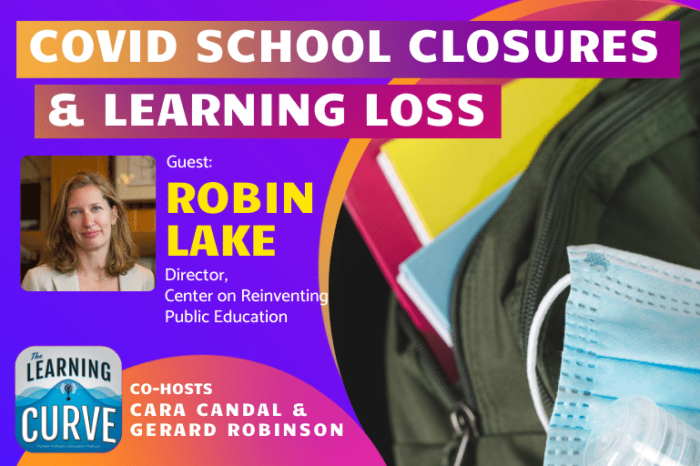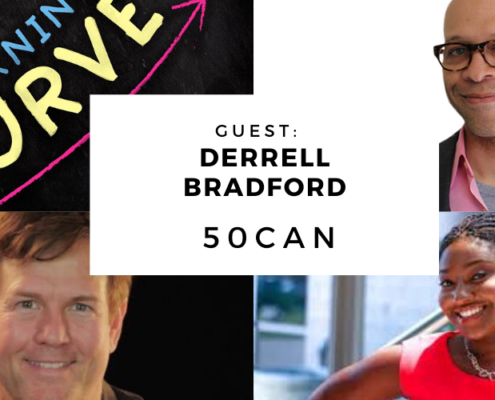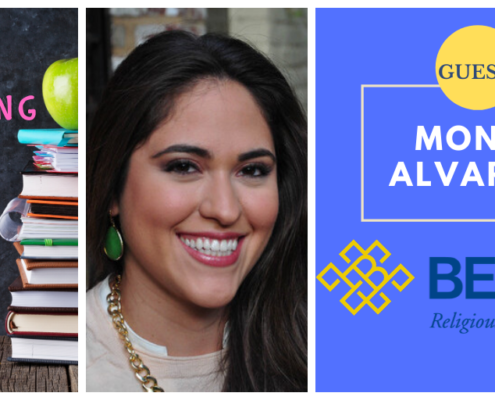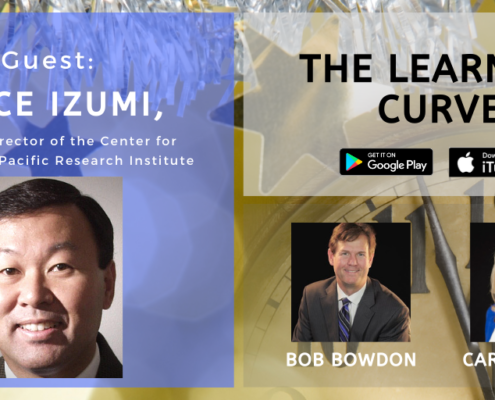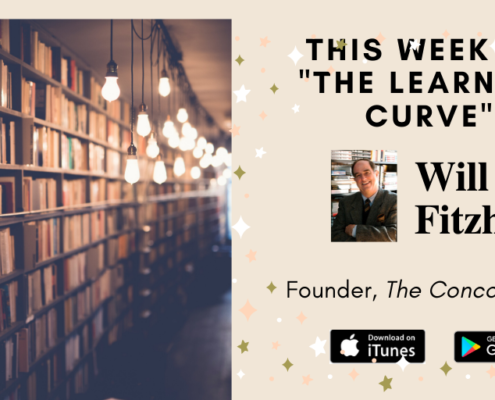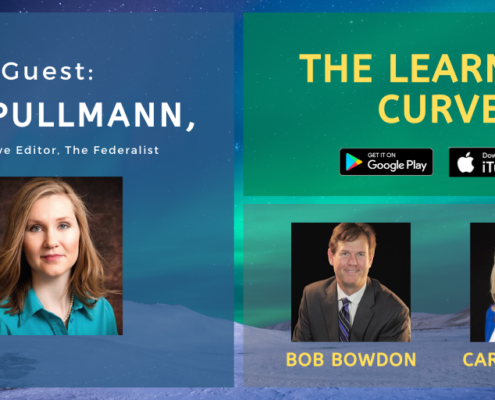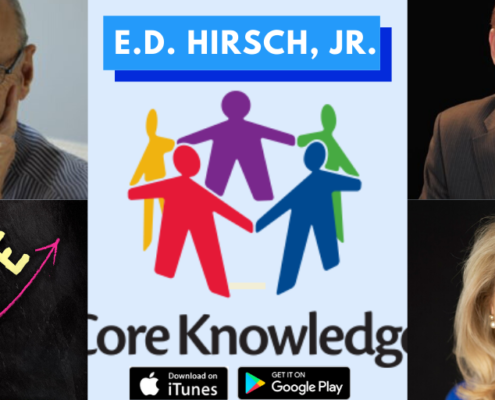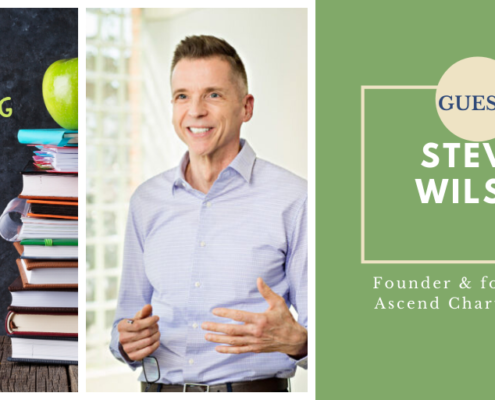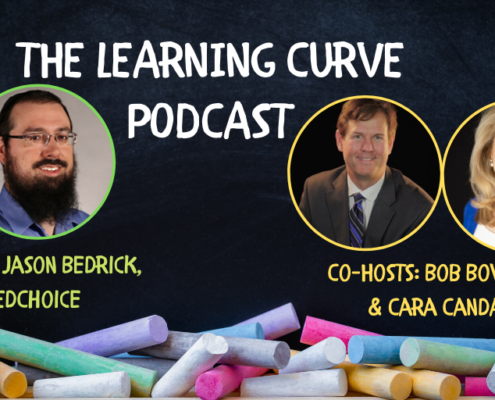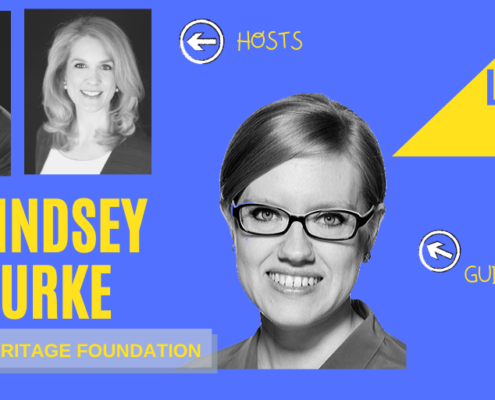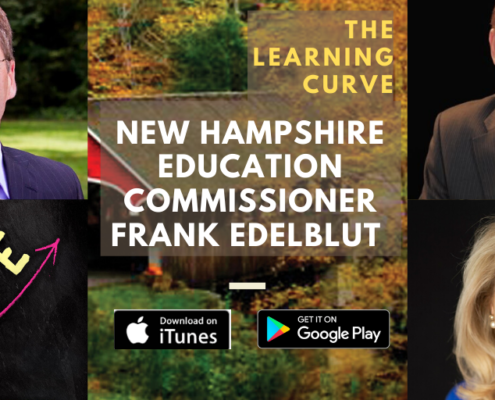CRPE’s Robin Lake on COVID School Closures & Learning Loss
This week on “The Learning Curve,” co-hosts Gerard Robinson and Cara Candal talk with Robin Lake, director of the Center on Reinventing Public Education (CRPE), a non-partisan research and policy analysis organization developing transformative, evidence-based solutions for K-12 public education. Robin describes the type of research CRPE conducts and how it has evolved over time, and shares her view of the impact it should have on schools, teachers, and families. She discusses CRPE’s work tracking school closures across the country at the height of the pandemic, the methodology used, and the findings so far. Robin reviews key takeaways from CRPE’s July report on how districts are allocating federal COVID-19 relief funds, and talks about how districts should spend those dollars. After sharing what her team will be focusing on as we emerge from the pandemic, she describes the challenges of leading a non-partisan research organization and remaining committed to the mission during a highly partisan era, with schools and curricula increasingly being drawn into political battles.
Stories of the Week: Finance and economics education improves young people’s financial literacy and helps prevent credit card and student loan debt, and insufficient savings for retirement. In New York City, Mayor Bill de Blasio is ending the school district’s Gifted and Talented program by fall 2022, in favor of a new program which he claims is more equitable.
Guest:
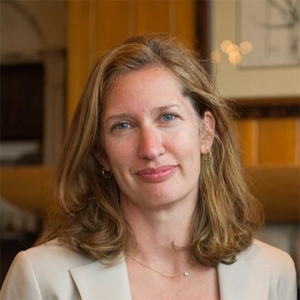 Robin Lake is director of the Center on Reinventing Public Education (CRPE) a non-partisan research and policy analysis organization developing transformative, evidence-based solutions for K–12 public education. Her research focuses on U.S. public school system reforms, including public school choice and charter schools; innovation and scale; portfolio management; and effective state and local public oversight practices. Lake has authored numerous studies and provided expert testimony and technical assistance on charter schools, district-charter collaborations, and urban school reform. She co-authored, with Paul Hill, Charter Schools and Accountability in Public Education, and has provided invited testimonies to the U.S. House of Representatives Education and Labor Committee as well as various state legislatures. Lake holds a BA in International Studies and an MPA in Education and Urban Policy from the University of Washington.
Robin Lake is director of the Center on Reinventing Public Education (CRPE) a non-partisan research and policy analysis organization developing transformative, evidence-based solutions for K–12 public education. Her research focuses on U.S. public school system reforms, including public school choice and charter schools; innovation and scale; portfolio management; and effective state and local public oversight practices. Lake has authored numerous studies and provided expert testimony and technical assistance on charter schools, district-charter collaborations, and urban school reform. She co-authored, with Paul Hill, Charter Schools and Accountability in Public Education, and has provided invited testimonies to the U.S. House of Representatives Education and Labor Committee as well as various state legislatures. Lake holds a BA in International Studies and an MPA in Education and Urban Policy from the University of Washington.
The next episode will air on Wednesday, October 20th with guest, David Reynolds, a Distinguished Professor of English and History at the Graduate Center of the City University of New York. He is the 2020 author of Abe: Abraham Lincoln in His Times, selected one of the Top Ten Books of the Year by the Wall Street Journal and the Washington Post.
Tweet of the Week:
Researchers at Harvard’s Center for Education Policy Research, @NWEA and @caldercenter will partner with a consortium of districts across the United States to provide timely information about tutoring, after-school programs and other interventions https://t.co/VclsW9FuIO
— The 74 (@The74) October 10, 2021
News Links:
New York Post: NY to Phase Out Gifted and Talented Program
CNBC: To raise successful children, teach them about economics
Get new episodes of The Learning Curve in your inbox!
Read a Transcript of This Episode:
Please excuse typos.
[00:00:00] Cara: Hello listeners. It is. , I’m going to call it Nobel prize week here on the learning curve. I am here with the fantastic Mr. Gerard Robinson, who George did. You wouldn’t know about prices?
[00:00:11] GR: Not yet, but, , my time will come.
[00:00:14] Cara: next year. Yeah. I was thinking I might be next year. No, I’m really excited because you know, who did probably read that Joshua anchors of the, Massachusetts Institute of technology also known as MIT has won the Nobel prize in economics, , for his research, which includes research on, , charter school effectively.
[00:00:37] So no that, oh, see, I’m super excited about this because you know, well, you and I are both charter school nerds and years ago with pioneer Institute. , I published a book about charter schools in Massachusetts and, Angrist and his team are heavily cited throughout that book. They studied Boston charter schools in particular at which, they found to [00:01:00] be very effective.
[00:01:00] Can you imagine drug? They actually found these schools to be incredibly effective , and it’s just really feels great for him and his team, such, great team of researchers for Angus who has, uh, you know, in his research goes far beyond charter schools, but his game is really like finding natural.
[00:01:17] Charter schools are among them, right. They provide, a randomized control trial right there without having to actually, separate kids into groups because they separate themselves. And the whole idea being that you can compare kids who applied to charter school lotteries and did not get in, in kids who applied to charter school lotteries and did get in.
[00:01:36] And you’ve got a similarly motivated group. Hence natural. And I just have to share with you Gerard, that I have memories of folks who don’t like charter schools so much saying to me, after reading my books or reading my. I don’t know this research that you cite. It can’t be very high quality and I’m thinking, well, okay, now, now you’ve got a Nobel prize winner.
[00:01:55] So how’s that for high quality. So that’s, it’s gotta be on the learning curve. It is [00:02:00] here we are. We’re prize week Gerard. So what’s on your re I, that’s not even my story the week, by the way, , just the intro, because I’m so excited.
[00:02:09] GR: Well, you actually sent me up. Well, because my article of the week is about economic education and K-12 education.
[00:02:16] Cara: Imagine that I didn’t even mean to. So
[00:02:20] GR: my story is from Michelle Fox and she is with C NBC and it’s from October 11th. And the title is to raise successful. Children, teach them about economics, education experts say. So I grew up in a home where we did not talk a lot about money, whether it was personal finance or whether it was how to say.
[00:02:39] How to use a credit card. We just did not do so and come, we’ll find out I’m not radically different from a lot of families today. And so the author basically said, listen, if we expect. For our children to become responsible handlers of power, which includes personal finance and economics, guess what? They should learn something about [00:03:00] economics.
[00:03:00] And she reminds us that if we don’t think we have an economics problem or a personal finance problem, just take a look at student loan debt, you know, which is 1.6 trillion and take a look at credit card debt. And so in previous, you know, several years, in fact, States have actually made a push to try and talk a lot about financial literacy and that led to April becoming financial literacy month.
[00:03:25] We’re proud to find out that October this month, mark, the first ever national economic education law. And this is something that’s been supported by man works. And who is the president and CEO of the council of economic education. And she’s a member of CNBC’s invest in financial wellness council. And what she said is that people have to start paying attention to how to look at societal issues through the lens of economics, whether that’s.
[00:03:53] COVID whether it’s looking at finance or even education, how we funded that economics [00:04:00] matters a lot. Well, in order for that to take place, we had to take a look and really prove to people that economics was something we needed to study. Because if you look at our family, We have challenges. For example, the author identified that various industry research found that get this two or three families lack any type of emergency savings.
[00:04:19] 78% of families that have paycheck to paycheck and three and five adults and not maintain a monthly budget. And when they did a deeper dive, they found out that many families. For a host of cultural and social reasons that just economics do not talk about finance. And so there is a professor at George Washington university.
[00:04:39] Her name is Anna Marie, who starting, and she’s a professor of business. She’s also a founder and academic director. Of the school’s global financial literacy excellence center. And she said, you know, students come to my class. They don’t even know how credit cards work. And many of them have real ideal how student loans work.
[00:04:59] So with the [00:05:00] push to make, , October. Economic month. The goal is to make sure that a families have conversations about how to make decisions about money in their homes. Teachers can now invite business, community leaders to share with their students, decision-making processes. And for those who are listening, if you want to go to council for.
[00:05:19] Econ ed.org. You can actually find resources for K-12 education programs and others. I think this is important because for all the reasons we say, but here’s what I’ve found really interesting. So they actually conducted a survey. And again, this is, the council for economic education. And in 2020, they identified that 21 states require high school students to take a course in personal finance.
[00:05:46] 25 states require high school students to take a course in economics five to not, and only five states, steel drown include personal finance and their studies. So given the fact that you and I share some states in common in Michigan, you will be [00:06:00] proud to know that of the six categories they have in place.
[00:06:03] Everything from standards to implementation, Michigan. Five of the six
[00:06:08] Cara: box check
[00:06:11] GR: my own home state of Virginia. We have four of the six boxes checking on glad to bed, but for Massachusetts, the state that is home to this, they actually have fewer than we would think for a state that leads so many things.
[00:06:25] So economic. Nobel prize winner economics. We now have an economic education month, so we need to shout this up to the mountain top. And in all seriousness, if we expect to maintain our way of living is going to require people to be financially responsible with their money, but also with the government.
[00:06:47] Cara: I love that story, Gerard, I think it’s really, really important.
[00:06:51] And, I think too, , you say that this is really everybody’s problem it’s we, you might have preconceived notions about who knows how to handle their money and who [00:07:00] doesn’t. But the fact of the matter is is that, I think probably this is my guessing and maybe your article talks about this.
[00:07:07] I would assume that, , in this country probably. The people with the lowest incomes, , know more about what’s coming in and what’s going out, then those who are in the middle class able to be in some sort of debt, have credit cards, things like that. And that’s where we, as Americans are really undereducated and quite frankly, it’s sort of.
[00:07:28] a luxury to be able to be that irresponsible, but it gets us in a lot of trouble. And just like you said, I did not grow up in a home where we talked about this and I can remember going to college and being bombarded with credit card offers and just sort of thinking it was free money. It wasn’t until I had to go to my parents and say, oh yeah, I have this bill.
[00:07:47] And they were like, no, it wasn’t like they were going to pay for me either. I had to learn that hard lesson. It also I’ll share that. as I’ve talked about before, my husband grew up in Argentina, and this is a [00:08:00] place where it’s very uncommon for people to, for example, mortgage their homes. It’s very uncommon for people to have credit cards and credit card debt.
[00:08:08] So you’ll heal just like student loans for him. He just looks at me sideways. He’s like, how on earth do you have student loans of that guys? And I’m like, wow. I went to school for a really long time. So I think that, maybe it’s not an American phenomenon, but it is a distinctly American trait, I think, to not know enough about like what you actually have and what you can actually buy.
[00:08:30] And let’s face it. It’s probably, there are so many statistics about the number one cause of stress is money and, you know, people get divorced over money, stuff like that. This is a really important. Factor in educating our children to be not only, it’s not just about math, which it is about math, right.
[00:08:46] But it’s about being happy, healthy people. and so some of us, even if you were born into a higher economic class, and you live higher up on the income letter that does not mean that folks are financially irresponsible or literate. [00:09:00] Right. So, and I bet probably a lot of people are nodding along at home as they listened to this.
[00:09:04] So I am all for it. I love that story. Thank you for bringing it to our attention. I’m going to take a hard turn in. We’re going to New York where you might’ve heard that mayor bill de Blasio, he has called an end Gerard to the city’s gifted and talented program. , so you know, we’ve been reading a lot of.
[00:09:22] Specialized schools, magnet schools, exam schools. So on in places, many of them here in the Northeast where these things tend to exist. private schools for free in many regards, right? These, exam admission schools, but Blasio at the end of his term, and, his critics are saying that you haven’t really done anything about educational equity.
[00:09:42] And I’m not saying that now, maybe I am a little bit, but, here you are. You’re going to just issue an edict that says this is the end of the city’s gifted and talented program. And the idea here is that this GNT program. Inequitable. it is exam-based so kids have [00:10:00] to test into it. And I think there is something Gerard to the argument that parents who are highly educated themselves, who know the system, know how to navigate the system, know how to help their children be successful on exams, exam taking is a skill.
[00:10:14] Let’s be clear. I think there’s something to that argument. I’m not necessarily convinced that we should abolish gifted and talented programs. I, myself, Gerard now don’t be too surprised, but I was a gifted and talented child in the eighties. And I got to tell you, what I take away from that experience was it made me pretty unpopular my peers and I, who were separated from the rest of the kids in a different, like we have the school, came home with some spit balls in her hair.
[00:10:39] I will say that, but on the upside. You know, we’ve got a highly personalized education. And I think maybe part of de Blasio’s argument is that every kid should have this education. This type of education should be on offer to every child, regardless of how you fare on an entrance exam. However, I have to say, I questioned the ability given its [00:11:00] track record of New York city’s public schools to deliver this kind of education to all kids, because that’s what they’re planning to do.
[00:11:06] and he and his, superintendent introduced. , a program that’s going to replace the gifted and talented program called brilliant NYC. It’s accelerated learning for kids ages eight and up that will take place in their assigned classrooms. so you could imagine being a teacher. So teachers Imagine being a teacher with what, 30 kids in your classroom.
[00:11:26] You’ve been a teacher I’ve been teaching. often what we know is that even the best teachers who can really differentiate instruction, sometimes what you end up doing is teaching to the middle because you’re trying so hard to make sure that everybody gets what they get. And so there were a couple of quotes in this article from teachers saying.
[00:11:42] As if it isn’t already hard enough, you’re expecting us to come in take kids who would have qualified for this other track. And we’re going to have to differentiate for them, differentiate for children who are coming in at, what four or five, six different levels in the name of equity. So I think that this is one [00:12:00] to watch.
[00:12:00] They’re saying, I don’t know, but the article claims that there was not a Lisbon, the New York post, by the way. So no fan of DeBlazio I think, but, there wasn’t a lot of parents. And you can imagine which parents are upset in which parents don’t care much. So the parents of the kids who would have qualified for the GNT programs are indeed pretty upset.
[00:12:19] It’s sort of like these struggles we’re seeing over exam schools. I’m going to watch this one. Gerard, I don’t know exactly where I come down, except I don’t really think that either. , that either camp has the perfect answer. And I’m always left with the question, like, are we looking for a quality of outcomes here, or are we looking for equitable opportunities?
[00:12:38] And you know, I always fall in the camp of the latter. I think this is about creating equitable opportunities for all kids. And it’s just too bad that we didn’t see the mayor get closer to that because I don’t know that this does.
[00:12:51] GR: I am a supporter of having separate programs for people who have the gifts and the talents to take advantage of it.
[00:12:58] So you’ll be [00:13:00] surprised to know that I too was in gifted and talented
[00:13:03] Cara: for
[00:13:05] GR: sports, not academics. And it’s similar if you think about it. And so I had to be, I was tested in terms of how fast I could run a 40. , how many times or how many, , weights, I could lift pounds, got tackle. Could I move?
[00:13:20] And if you didn’t do well, you didn’t make the cut. So there was an examination that wasn’t written, it was non written. And if you were gifted and talented, you find yourself playing the skill level scores that you needed to. If we treated college football and the entrance into becoming a pro athlete at a division one school, the same way we did get that in talent.
[00:13:42] The schools that currently make up the top 50 programs that look radically different. Why? Because taking someone who is gifted and talented, let’s say in stem and someone who is gifted and talented in, let’s say the 40 yard dash, and then putting them in very [00:14:00] different settings where gifted and talented means something different to different people.
[00:14:04] It will be a train wreck. And so I’m all for the idea of looking at schools and saying, well, You don’t have enough women or you don’t have enough, , people of color or you don’t have people from the right zip codes. I get it. But in the absence of gifted and talented programs, how do these programs come into existence in the first place?
[00:14:23] It’s because the traditional school system did not have at certain schools, school levels or certain zip codes. That program here at Virginia, we have a governor school and we created governor’s schools back in the 1970s in part. So if the public school system said, you know what, we’ve got a group of students who are advanced and who should come together during this time.
[00:14:45] Or in a year round program or other programs in order to provide them with what options, same thing we say about other programs. So I think trying to abolish the program will never get you to equity. What it will do will be an [00:15:00] equity of outrage, either from the parents in school closed or for the children like me, who Hey, parents will say, Hey, let’s put Gerard.
[00:15:08] It would have been a disaster for me that they would have been upset. And then the parents, like my, wife’s parents who would, surely would qualify for gifted and talented, they would have been equally upset. You took the class from her and you gave it to Gerard and Gerard can’t handle it. So, I just think this is just more unnecessary social engineer.
[00:15:25] Moving in the wrong direction and in an environment now where families are already riled up, take families at Thomas Jefferson high school, and they’re the Virginia top rated public school in the country where they removed and exam to get in order to try to what I call colorful classrooms. It’s not going over well, so I’m not a fan of abolishing.
[00:15:47] It. If we want to deal with equity. And I agree with you, test taking is something you can learn as a skill. I also don’t think that some of these tests are totally wastefully biased, as much as culturally [00:16:00] bias. Given the fact we have people of color who are in there and they’re not just Asians
[00:16:05] Cara: and not all.
[00:16:08] GR: Yeah. So
[00:16:11] Cara: I think we’re probably pretty close to the same page and you know, something that you were teetering upon there. Here’s an idea. Quit redlining kids in schools make your public schools, distinct from one another offer distinct things to the kids that need them and let parents have an option.
[00:16:28] Right. And that’s something that, of course we don’t think DeBlasio was going to go out with a bang. we will see. If this program, this new, what did I say? It was called the brilliant program. The brilliant NYC. We’ll see how brilliant it turns out to be according to the parents of New York city. some of them will leave for private schools.
[00:16:44] No doubt. If they can afford to as has been the case. So we , could probably ask our next guest to weigh in on this, but she’s got so much cool research to talk about that. I don’t know. We’ll probably we’ll want to change the subject because coming up right after this, we are going to be [00:17:00] speaking with Robin lake and she is director of the center.
[00:17:05] For reinventing public education. I pause there because I just usually call it survey. And it’s also the center on reinventing public education, but I just have a great deal of respect for Robin’s work for the work of her team and for what they do over there in Washington. So we will be back with Robin right after this musical intro.
[00:17:43] Listeners we’re back with Robin lake. She is the director of the center on reinventing public education, otherwise known as SURPI a nonpartisan research and policy analysis organization, developing transformative evidence-based solutions for K to 12 public education. Her research [00:18:00] focuses on us public school system reforms, including public school choice and charter schools, innovation and scale portfolio management and effective state and local public oversight practices.
[00:18:11] Lake has authored numerous studies and provided expert testimony and technical assistance on charter schools, district charter collaborations, and urban school reform. She coauthored with Paul Hill charter schools and accountability in public education. Probably more times than I can count my own dissertation on charter schools.
[00:18:29] And she’s provided invited testimonies to the us house of representatives, education and labor committee, as well as various state legislatures. Robin holds a BA in international studies and an NPA in education and urban policy from the university of Washington, Robin. Thanks so much for joining us today.
[00:18:47] Robin: That was such a pleasure. Great to be with you. Yeah,
[00:18:50] Cara: we’re really happy to have you here and. Just talking before you came on. Um, Joshua Angrist winning the Nobel prize in [00:19:00] economics this week and he of course has done research on charter schools as well. , it was, it felt like , a good day for education,
[00:19:08] Robin: so cool.
[00:19:08] We know a Nobel Laureate. As
[00:19:12] Cara: I was floored when I heard it on the other radio Saturday morning, but well, we want to really focus on your work because as I said, I, have probably cited you and your work more times than I can count. , but , your title is director of the center on reinventing public education.
[00:19:27] And I will say, as somebody who reads your work and uses your work. You are known for rigorous and balanced research, which, which isn’t always the case, no matter what discipline we’re talking about. So can you describe the type of research that you do at SURPI? And I’m really interested in how the work has evolved over time, because you’ve, , you’ve seen a lot of changes just in the past decade, I would say.
[00:19:53] Robin: Yes, we have, I’m an odd duck because I’d been at the center for nearly 30 years, which is pretty crazy, but[00:20:00]
[00:20:02] yeah, five years, it was amazing. Learned how to read at the center now, , I met Paul Hill, our founder, and, , Paul handed me a manuscript for a book. He was writing called reinventing public education. And the premise was really that Paul had been studying. Through the Rand corporation where had been previously effective schools and especially schools that were effective in accelerating and meeting the needs of all kids from all backgrounds.
[00:20:33] And, , there were some emerging research during the eighties around. , what makes for effective schools, coherency internal accountability, clarity about the type of graduate, a distinctiveness, a sense of purpose, all those things. Right. But anybody who’s researched schools knows, but our question Paul’s question at the time was, okay, well, you can always point to some of those schools in a given community, but usually it’s only one or two.
[00:20:59] How could we make [00:21:00] it all? What would it take? And Paul had been studying. Systems and policies for a long time. And he was really acutely aware that there were those kinds of policies that gotten away, , that didn’t allow those kinds of schools to scale and replicate. And so the purpose of the center was really how do we reinvent those systems?
[00:21:20] So all schools can be effective. And it took us immediately to questions around choice with schools are distinctive families need to choose among them, autonomy, staffing, funding, accountability. How does that work? If all schools have different purposes? And then we started working toward this idea called portfolio systems, school systems that had a bunch of distinctive schools, but really managed for equity and performance.
[00:21:45] So, , it’s been an amazing, , 2030 years of working along those lines. And you asked about how things have evolved with. A few years ago, about five for our 25th anniversary. I had taken over as [00:22:00] director of the center and I was thinking, , the world has changed since the eighties alive.
[00:22:05] You know, Future of work is changing. , the need For school systems and schools to think about change and resiliency. I’m really trying to figure out how to maximize the opportunities and pathways for individual kids and look outside the boundaries of the school building. Those are not things that we originally contemplated, but seemed really, really important for us to start thinking about.
[00:22:28] Deeply. So we, we started sketching out ideas along those lines for our 25th and then bone the pen and all of the, worries that we had had about rigidities and lack of ability to meet individual needs. Showcased right in front of us. So we’ve tried to document a lot of that. And luckily we kind of jumped on some data and have been a pretty central resource for how school systems are responding , or not to different needs.
[00:22:57] And now we’ve got to turn [00:23:00] back to, or what does this all mean? Going forward. That’s the work of it, the next five to 10 years. How do we rebuild in a way that meets the promise of this generation of kids, but more importantly, meets the promise of the next generation. Not an easy question.
[00:23:14] No,
[00:23:15] Cara: no, it’s not an easy question at all now. So you mentioned the pandemic and many, many of us relied on, your work during the pandemic. So I want to, get there, but I want to push really quickly on something that you said at the outset. And you said that, , you and Paul discussed.
[00:23:30] Oftentimes it wasn’t, it was about reinventing systems because we sort of knew what works in schools that we have. We have a pretty good idea of what makes schools high-performing highly effective for kids, but that it’s these structures and systems that get in the way. And so, that sounds to me like.
[00:23:45] The desired impact of education research is, to reinvent those systems as you would put it, change those systems so that we’ve got equitable opportunities for kids and kids can sign that families can find places that they will flourish within the public system. [00:24:00] Right. And that can involve different sorts of choice, which we talk about a lot here, but can you describe a time perhaps when you’ve really seen the impact of your research, right.
[00:24:11] in a positive. And an outcome that made you happy.
[00:24:16] Robin: Sure. Sure. yeah, I mean, you know, to your point, we have a little tagline that I think , was Paul’s originally that public education is, , a goal, not a particular set of institutions. And so we’re happiest when we have. , had impact in terms of reframing a question.
[00:24:34] So it can be addressed in a totally different way, helping people challenge assumptions and say, why not? , why couldn’t it be different? Why couldn’t we do things radically differently? Does a school have to look this way , or could it be, , a set of opportunities within a community? That kind of thing, you know, to your point to your question on.
[00:24:54] What’s made me happiest. I would say that if I had to point to one line of [00:25:00] work that I’ve, really dug into personally, it’s been our work on special education. , started it a number of years ago with a focus on charter schooling. , a lot of people were worried about special ed as a vulnerability for the charter school movement, which it was, there were problems that had to be addressed, but we also saw it as a huge opportunity because we thought, well, , special education is not working.
[00:25:24] It hasn’t been working. Can we use this opportunity outside the boundaries of, what has typically been done to, to actually go for something better? And so, , for 10 or 15 years or so, we’ve been really trying to say, where are the bright lights within the charter school world within the district world and the private sector?
[00:25:43] How can we. Learn from that to try to construct something better. We’ve had a line of research going on that front for quite some time and it continues. And, , it’s I think I’m our most rewarding work. For me [00:26:00] personally. And it takes, me right again, to the core question that we we’ve been grappling with for the last five years or so for our most complex kids, we’ve got to think really differently.
[00:26:14] , and special education has a place where we see a lot of possibilities for. Honestly, if you go into any particular school and you want to learn about how do you know contract what individual kids need and what’s possible for them go to the special ed teacher, she’s got ideas. Yeah, absolutely. Yeah,
[00:26:34] Cara: no, , it’s really important line of research and I think shining a light on, , any, you know, at the outset you said, especially when we knew that there were problems in some charter schools, right.
[00:26:42] It’s shining a light on that and really talking about, , how does. Taylor education to meet the needs of individual students, I think is informative for all systems. , okay. So you mentioned the pandemic and. , a series of questions about this, because I have to, my first question is like, [00:27:00] so you guys were, I think a lot of, , ed reform organizations were thinking, oh, somebody should really track this school closures.
[00:27:07] , somebody should really think about like, what are districts doing? But it was a sort of a, not me, not me, not me. And then suddenly there it was and you guys are doing it and you were doing. Can only imagine the amount of work that it was, but can you describe to us what it was like to pivot that hard in that moment in March, I guess 2020, when it all sort of came crashing down in, in like, how did you go about it?
[00:27:30] What did you learn from tracking school closures
[00:27:33] Robin: throughout the. Yeah, it’s been a wild ride. Why live cattle? And, you know, the pandemic was starting to start to emerge. And, , I was looking around at, you know, talking to some local superintendents and thinking, oh my gosh, we had really, we were in for something really serious and we’re not prepared at [00:28:00] all.
[00:28:01] And so I remember thinking, , this I’m going to have to kind of set everything aside. I may have to shift our team. , and I just went on pure instinct. , I just had to trust my gut and kind of trust. But I had learned over the past few decades about system response and system abilities and inabilities.
[00:28:20] And I’m also a warrior probably helped. I thought this could go very, very badly. We’re all in the dark, you know, pulling information together. And as a researcher it’s tight, it was a really tough moment, right. Because there was not anything close to perfect information. What we did was we thought, well, where.
[00:28:42] Can we get something something’s gotta be better than nothing. And we thought, well, districts are posting information on their websites. Let’s just start pulling that together. So , we just quickly went after the largest hundred school districts and, got organized to find [00:29:00] that. And then we, um, got a representative sample together quickly and we just tried to be nimble and responsive.
[00:29:07] And I think one thing that really helped was the fact that it was. Over the years of, we’ve worked with a lot of practitioners. We had people we could call and say, you know, what’s going on? What, um, what are you seeing out there? And we also have a tradition of SURPI at trying to look around the corner, trying to be ahead of other folks in.
[00:29:28] What might be coming, what questions? So that was the approach that we took was let’s roll and let’s connect with as many people as we can figure out what’s needed. And the, , the fundamental tenants that we followed was let’s be helpful. What can we do to be helpful and just use whatever skills and capacities we have to inform the field.
[00:29:55] So that’s what we did, , in terms of what we’ve found. I mean, there’s so much, [00:30:00] and it’s easy to kind of get wrapped up in the masks and the vaccines and, the issue of the moment, we’ve tried to stay really focused on teaching and learning throughout this thing. And on that front, it’s not pretty the, , the kids are not all right in so many ways.
[00:30:18] and in other ways, , they’ve discovered so many important things, , as they’ve been out of traditional schooling. So, but on the not all right front, , we’ve convened some consensus panels of experts to kind of assess where we are. , I won’t get into the details of that, but I think, you know, it’s clear kids love.
[00:30:37] Really really critical learning opportunities and opportunities for gaining knowledge that if we don’t act quickly, they won’t recover. And those individual kids will pay the price and our economy will pay the price. So there’s that the social emotional dynamics are of course, so important. We’ve been talking.
[00:30:56] Closely the mental health and other struggles. And [00:31:00] then finally we’ve been looking at kind of the most vulnerable student populations and trying to understand what’s going on with them. So, you know, it’s not a pretty picture. , and so we’re, starting to think now about, Hey, given all of that, we’re w we’re conditioning to document it and we’ll be producing.
[00:31:16] report called the profile of the American students this winter, where we’re hoping to kind of compile the story into something that’s really understandable, but I think what’s on so many of our minds right now is where do we go from here? Is this just a question of catch-up, which is. , particularly easy problem on its own, or is it a much bigger problem of recovery renewal towards something much better, which is, you know, the biggest challenge that any of us school reform folks have, have faced.
[00:31:49] So it’s going to take all of us. It’s going to take our best ideas and it’s gonna take collaboration partnerships and very, very strong, well.
[00:31:59] GR: In [00:32:00] July, , your center published report that found that most districts are so far spending money on quote, what they know what our district’s doing today. And what would you like districts to think about when it comes to spending these.
[00:32:14] Robin: Yeah, thanks Gerard. Yeah, look, this is a massive cash dump, on districts. And I don’t think anybody was particularly surprised that what they’ve been doing is spending on, , staffing, , pay raises that they felt , were overdue. , just talked to a reporter who had dug into some data and found that there were massive expenditures on things like sports fields and, things that probably were shovel-ready right.
[00:32:39] Districts had plans, maybe somebody, a coach or somebody had been lobbying for this thing for a long time. And, uh, all of a sudden it was available. So. You know, that’s all what it is, not sustainable, right? And it’s not the stuff that’s going to, um, get a kid who, uh, has two more years [00:33:00] to graduate and just lost six months of critical math time into the college of their choice that it’s not going to cut it.
[00:33:08] what I, advise districts to do is really get clear about priorities and, I’m not opposed to sports, you know, let’s get our ducks in order first and make sure that every kid is on the path to college and career readiness. Before we talk about some of those extras. Um, and I think three, three buckets maybe, , the first is.
[00:33:33] , good old evidence-based solutions. It’s shocking to me, how few districts are really pursuing intensive, um, tutoring programs that any researcher would agree is probably the best thing you can do for catching kids up quickly, rigorous curriculum. Those kinds of just evidence-based solutions.
[00:33:52] A second bucket would be just, you know, creative approaches to catch up. We have a lot of people in the communities who have stepped up during the [00:34:00] pandemic. And provided support to kids. Let’s not close them off from the current challenges. Let’s actually bring them in, pay them for helping out with tutoring or, um, partnering for mental health and social service support.
[00:34:15] So the schools don’t have to take that on. And the third bucket would be just making investments in the future, , getting toward that sense of resiliency and, , taking pen. Discoveries and figuring out what we can do with them. Re-imagining the workforce. These are the things that we’re going to have to do.
[00:34:34] And, in three years when the money’s gone, we won’t have the option any longer
[00:34:39] GR: before I pivot to my next question. You’re the first part of your response reminded me when, you know, when you’re talking about, you know, paying for coaches and salaries. I remember when the American recovery and we invest an accurate tune, , 2009.
[00:34:53] Uh, was implemented, there were school systems that were doing the same thing. , some even hiring teachers, they let go because of cuts [00:35:00] and, within 24 months, some of those teachers had to be let go because the money they receive was not. And there wasn’t any planning. So hopefully we don’t have a, repeat of that.
[00:35:12] Robin: You’re absolutely right. History is about to repeat itself and remember the folks who are going to be laid off first , or, the most junior folks, , folks who have a lot of energy ideas and, , not necessarily the folks who are gonna move the needle the fastest for the most kids. So there we have it.
[00:35:31] GR: Well, there you go. Let’s talk about politics. , right now education is very partisan. Even with our reform movement, both public private, very fractured your center, you know, of course describes itself as a nonpartisan research institution by most accounts. , we’re living in that, , very high times of partisanship.
[00:35:50] How do you, as a leader of the center, basically walk the line in terms of talking about. School curriculum talking about research [00:36:00] and being able to do so in a way where the research is clear it’s nonpartisan and is given in a way that people can say, yeah, , the center is just a straight shooter because a lot of people aren’t doing that.
[00:36:11] How are you able to do so?
[00:36:14] Robin: Yeah, well, I do think we’ll probably, I’m pretty well-respected but a lot of different, , more part of this. Oriented folks, policymakers tend to call us from all stripes, which we’ll really proud of. I’m really not sure why, you know, we’re um, we’re people who like to. We liked to be truth tellers.
[00:36:37] , we like to surprise people. We like to be creative and unconventional. , and you know, we just try and stay focused on the question and the question at hand and not get pulled into the noise of the politics. , now, that also means that we make people on both sides angry. , and I’ve always felt like, it’s [00:37:00] a little bit of a lonely position, but on the other hand, as long as they, get over it and call us the next time, then I think , we’re doing our jobs.
[00:37:09] So, , Yeah. unfortunately it is all too unusual, but I think, you know what, we try to be a collection of people to think in the gray, , who just don’t like, , dichotomies. And luckily there seems to be still a little bit of space.
[00:37:27] GR: No. I’m glad to have you in the space because when your name is mentioned and , I’m on the right and right.
[00:37:32] Circles, people like, yeah. You know, good research, there are other names I could mention. And there are a lot of different responses other than good research. So, , continue to agree. Work. There will speak in a research. And this is my last question, , as we emerge out of the time that we’re in right now, Should researchers and educators, , what should they be thinking about?
[00:37:52] You know, we have a cadre of young scholars who are going to enter the field, , with a very different set of data points to look at. , then some of [00:38:00] us, let’s say you had 15 years ago and we’re going to have, , with 30 gubernatorial elections, , they’re going to come up. What are your recommendations to people who sit in academic academies and think tanks, research centers, but also in state and federal government.
[00:38:17] Robin: , far be it for me to really say what people should be doing. I’ll speak from my own experience. What gives me energy ideas? Inspiration is really, , getting down to. Direct contact to a students, families and educators, really listening to them, observing. , and then, trying to from there kind of, , get up to the policy implications.
[00:38:46] , it just makes it also real. And now I can’t imagine a more important time than now to do that when students and families, educators were thrown into such [00:39:00] craziness and have really, really important observations, discoveries, thoughts, reflections. , they have things to say, let’s listen to them. So the most rewarding research that we’re doing right now is interviewing people who have participated in pandemic learning pods, who just when they were out of the traditional system.
[00:39:24] What did they create? What did they discover? And it’s amazing to hear educators talk about their experience, because they’ll say this is the reason I got into teaching this kind of relationship based really, you know, customizing for kids, , families saying, Hey, I never realized that I really enjoy being really more deeply engaged in my kids’ education or kids saying, Hey, It’s really cool to be able to control my own schedule and say, well, I want to study and then have people work around that and [00:40:00] give me something that excites me.
[00:40:02] So there’s just so much rich soup there. , so much risk which soup and so much to contemplate about the systems that we’ve built and kind of ask ourselves why. , and then it’s Siri. It’s also equally important to, to listen about. How, how should we be defining success as we move forward? And how would we know that we’re getting there?
[00:40:24] I don’t think we’ve grappled with that kind of question. So I don’t know if that’s helpful. That’s where my head is. , shame on us. If we don’t take this moment to reflect.
[00:40:36] GR: I like that word, because when we often discuss education, we think of R which is resources, , and that’s important, another ours results, but yeah, let’s just take time to reflect, you know, when I heard you say that teachers.
[00:40:50] You know, we’re excited about what they were doing to say that this is in fact as why I entered the profession. And Cara had an early question, , for you, but also in your background, you worked in [00:41:00] charters, Minnesota in California, where the first two states charter law and both of those laws were created in part to give educators a chance to practice their craft their profession in unique ways.
[00:41:11] And so we can come out of this either crime or crime from. And so hopefully it’s the latter.
[00:41:21] Robin: I love that. So,
[00:41:23] GR: Robin again, thank you so much for joining Kara and I today to talk, shop about the work you’re doing. And, , as always I learned something, what I hear from you and when I read your work, so our listeners, I’m pretty sure are going to be excited to see what you come out with.
[00:41:37] Robin: I thank you so much. Yeah, it was a really fun conversation. And I will say that the pioneer Institute I ran into and I was, visiting Massachusetts and there were 12 charter school laws based at backend. No, no, 1992 or something. So y’all have been on my radar for a very long time and, , really respect your work.[00:42:00]
[00:42:00] Cara: Thank you. Thanks so much.
[00:42:59] All right. Do you [00:43:00] ever going to close it out with a tweet of the week? This one from, , 74. And the tweet is I was just talking with somebody about this this morning. It’s pretty exciting. Researchers at Harvard center for education policy research at N w E a and the Calder center will partner with a consortium of districts across the United.
[00:43:20] To provide timely information about tutoring, afterschool programs and other interventions, , timely. Yes. I love that. They’re going to do this. This is, these are some real , heavy hitters here in, the area of educational research. So figuring out by having this consortium of districts come together, whether or not.
[00:43:40] These tutoring programs, interventions, many of which I’m sure will be funded with relief money. If districts would actually decide to do that, maybe some of them have, um, if they’re actually working. And I think this goes back to conversations that we’ve been having with some of our guests are, are.
[00:43:56] Whether or not how we’re going to know if we’re getting any bang for our buck out of [00:44:00] all of the stimulus money. So, , I think it’s a great effort. We will keep an eye on it and maybe we’ll even get somebody to come talk to us about it. , the learning curve, but that’s all I got this week. My friend, next week, Gerard, we are going to be back with David Reynolds. He is a distinguished professor of English and history at the graduate center of the city, university of New York and biographer of Abe Lincoln.
[00:44:22] , his biography of Abraham Lincoln was selected as one of the top 10 books of the year by the wall street journal. So Gerard until then, I hope you have. A wonderful week. It’s always a pleasure to spend time with you.
[00:44:33] GR: I enjoy the way that we use economy of scales to get done on time.
Related Posts:

